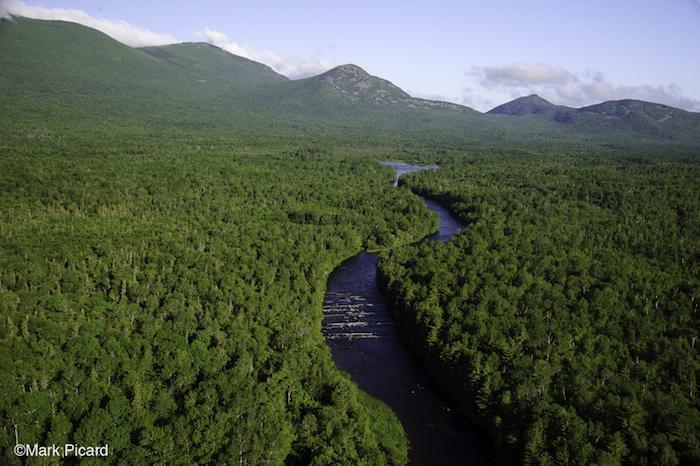
A coalition of venture capitalists and business owners has urged Interior Secretary Ryan Zinke to drop his recommendations for changes to 10 national monuments, including Katahdin Woods and Waters National Monument in Maine/Mark Picard
A group of venture capitalists and entrepreneurs that views public lands as a valuable quality-of-life issue for employees is urging Interior Secretary Ryan Zinke to scrap his recommendations to shrink the boundaries of national monuments or allow for resource extraction in them, saying preservation of monuments is "critical" for corporate success.
"Our most driven employees place a high value on outdoor recreation, making proximity to public lands and national monuments a major selling point for companies across the country that want to recruit key employees -- a critical requirement for thse companies' success," wrote the co-chairs of the Conservation For Economic Growth Coalition.
A copy of Secretary Zinke's draft memorandum to President Trump calls for a number of changes to monuments ranging from Bears Ears in Utah and Cascade-Siskiyou in Oregon to Organ Mountains-Desert Peaks in New Mexico and Kathadin Woods and Waters in Maine.
To date most of the public opposition to the secretary's recommendations to President Trump has come from companies with direct outdoor connections, such as Patagonia and the Outdoor Industry Association, groups such as the Backcountry Hunters & Anglers, and non-governmental organizations that advocate for parks and the outdoors, such as the National Parks Conservation Association, the Sierra Club, and Trout Unlimited.
The Conservation For Economic Growth Coalition, meanwhile, reflects the interests and concerns of a group that should appeal directly to the president: entrepreneurs and venture capitalists who build businesses and, along the way, strengthen the economy. The group formed back in December 2014 to lobby for more conservation of national parks and public lands. Since then it has been active in promoting national monuments as economic drivers.
On Wednesday co-chairs Nancy Pfund and Tom Baruch wrote Secretary Zinke with a request (attached below) to withdraw his recommendations to President Trump.
"Plans to locate new facilities, to expand existing ones, or to make venture capital investments in companies, are based in part on the likelihood that it will be easy to recruit and maintain a high-quality work force; one of the factors in calculating that likelihood is proximity to world-class recreational opportunities our national monuments can provide," they wrote. "Simply put, your recommendations to remove protections for our national monuments and the uncertainty created by those recommendations are bad for business. We urge the administration to end the review process and announce as soon as possible that no public lands will lose their protection."
The coalition's executive director, Patrick von Bargen, said Wednesday during an interview that the group is greatly concerned over the lack of details in the secretary's recommendations.
“He’s made this set of recommendations to the president that lack the kind of specificity that you need to get to before you take any action on this," Mr. von Bargen said. "We just wanted to make clear that the general thrust of this report creates lots of uncertainty for our companies, and if it were actually implemented would be damaging to what fast-growing companies sort of count on for their employees over a significant period of time.
"So here we have this report, it lacks lots of detail. Putting the detail on it would take an enormous amount of work and quite a bit of time, I think, so we’re supposed to just sit with this report for what, two, three years while this is all worked out? It’s exactly the kind of uncertainty that businesses hate," he said. "If they’e going to try to do all this administratively, by just simply saying we’re going to reverse the Antiquities Act declarations that previous presidents have made, we have no idea what process they are going to follow. Are they going to take testimony, are they actually going to propose specific changes? How are they going to collect input on those changes? We don’t know any of that.”
Meanwhile, an Associated Press report out of Montana questioned Secretary Zinke's motivations when he not only declined to recommend any changes to the Upper Missouri River Breaks Monument in Montana but then proposed a new national monument for the state, one that would cover roughly 130,000 acres in the Badger-Two Medicine Area of the Lewis and Clark National Forest south of Glacier National Park.
"We're happy he recognizes the importance of the Badger Two-Medicine," Land Tawney, president of the conservation group Backcountry Hunters and Anglers, said in the article. "Places that are very similar in fashion, like Bears Ears, he's not quite protecting. ... You can't talk out of both sides of your mouth."
At the Mountain States Legal Foundation, which long has lobbied for multiple use of public lands, William Perry Pendley, struggled to understand why Secretary Zinke would propose the monument.
"It's terribly disappointing," Mr. Pendley said in the AP article. "What the secretary ought to be sending to the president is a recommendation to repeal the Antiquities Act, to put an end to this issue."
Speculation around Mr. Zinke's mention of the Badger-Two Medicine monument proposal has been tied to his political aspirations as a possible U.S. Senate candidate in 2018 or a possible run for Montana governor in 2020.





